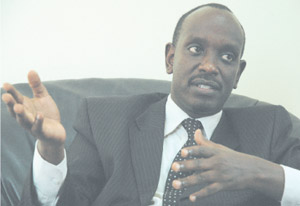Amid renewed human rights violations by FDLR rebels against Congolese civilians, Rwanda has said Kinshasa was slow in implementing its obligations under the November 9, 2007 Nairobi Communiqué signed between both countries. Representatives of Rwanda, DR Congo and other parties to the process, last month met at the UN headquarters in New York to assess the progress made under the Nairobi Communiqué in which Kinshasa agreed to disarm all FDLR militias and repatriate those willing to Rwanda.


Amid renewed human rights violations by FDLR rebels against Congolese civilians, Rwanda has said Kinshasa was slow in implementing its obligations under the November 9, 2007 Nairobi Communiqué signed between both countries.
Representatives of Rwanda, DR Congo and other parties to the process, last month met at the UN headquarters in New York to assess the progress made under the Nairobi Communiqué in which Kinshasa agreed to disarm all FDLR militias and repatriate those willing to Rwanda.
Rwanda was represented at that meeting by its Permanent Representative to the United Nations, Ambassador Joseph Nsengimana.
In the Nairobi Communiqué, DR Congo had committed itself to launch the disarmament exercise in mid March, this year, but fifty days later, nothing much is on the ground. Other parties to the agreement are UN, AU, US, EU and South Africa –
President Paul Kagame’s Special Envoy to the Great Lakes region, Ambassador Richard Sezibera, said yesterday that Kigali has learnt that DR Congo is involved in sensitizing FDLR fighters to disarm.
"That’s all we know. They also said they will later on carry out military operations against FDLR," Sezibera said.
In that regard, Sezibera said that the implementation of the Communiqué could be expedited, noting that the "disarmament of FDLR is fourteen years behind time. They should have been disarmed in 1994."
By that, he was referring to the fact that FDLR – which is composed of mainly remnants of the defunct Rwanda Armed Forces (FAR) and Interahamwe, a militia that spearheaded the Genocide – was established by the same people responsible for the death of the over one million Rwandans in the 1994 Genocide.
Sezibera seemed to indicate that Rwanda had less to do in as far as ensuring that the Nairobi agreement succeeds since the Communiqué will almost entirely be implemented within the territory of DRC.
Previous disarmament agreements have not been adhered to by the DRC Government. However, during the meeting of the monitoring Group for the application of the Nairobi Communiqué in New York, delegates "noted with satisfaction the results registered by the DRC in conducting the sensitization campaign in North and South Kivu aimed at encouraging the ex-FAR/Interahamwe to voluntary disarmament and repatriation," according to the UN Mission in Congo (Monuc).
DR Congo’s representatives ‘made it known that a site has already been identified in the province of Katanga for the relocation of ex-FAR/Interahamwe who still refuse to return to Rwanda after disarmament.’
In a statement, Monuc said that the DRC Government will seek to identify those people who are accused by the International Criminal Tribunal for Rwanda (ICTR) and the Rwandan courts but find refuge in Congo.
Observers say while it could be easier to identify those indicted by ICTR given their high-profile status, it was difficult to identify every militiaman responsible for committing Genocide crimes especially since many are believed to have changed names, acquired Congolese identity and fluently speaking indigenous Congolese languages.
Representatives from both sides – DRC and Rwanda – urged the United States and the European Union, to ‘take coercive measures against the political leaders of ex-FAR/Interhamwe who live in the United States and in member countries of the European Union, and to do whatever is necessary for the success of the Security Council’s Resolution 1804 about the return of ex-FAR/Interhamwe to Rwanda.’
The UN Security Council recently urged member states to respect the resolution which imposes financial and travel sanctions against three top FDLR leaders, and promised to extend similar sanctions to other FDLR rebel leaders.
"As you know FDLR is also active in Europe. We hope those nations will act accordingly by sanctioning them and stopping their activities on their territories," Sezibera said yesterday.
The rebels’ overall leader, Ignace Murwanashyaka, resides in Germany.
The FDLR have lately been involved in human rights violations in eastern DR Congo, forcing humanitarian agencies to halt relief programmes for hundreds of thousands of displaced persons.
"They are doing what they know best. They are killing people, raping, looting and burning homes in Rutshuru area and elsewhere. Their aim is to come and destablise Rwanda," Sezibera observed.
The New York meeting was presided over by Alan Doss, the head of Monuc, the peacekeeping force facing accusations of exchanging arms for gold with FDLR and other militias in the Congo.
Ends


